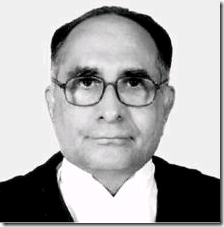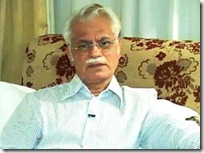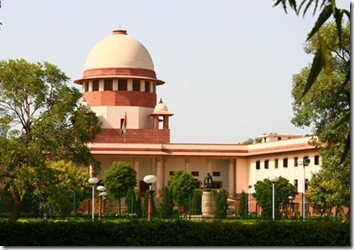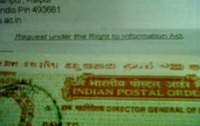Supreme Court
The Hindu has compiled a handy (but non-exhaustive list) of judicial and quasi-judicial bodies headed by retired SC judges, after Arun Jaitley’s and others’ comments criticising the existing rules about ex-judges’ appointments.
1. The National Human Rights Commission: Chairperson Justice K.G. Balakrishnan, former Chief Justice of India. Member Justice G.P. Mathur.
The Law Commission of India: Chairperson Justice P.V. Reddy.
3. The National Consumer Disputes Redressal Commission: President Justice Ashok Bhan.
4. The Press Council of India: Chairperson Justice Markandey Katju.
5. The Competition Appellate Tribunal of India: Chairman Justice V.S. Sirpurkar.
6. Justice Lokeshwar Singh Panta, who was appointed Chairperson of the National Green Tribunal, resigned to become the Lokayukta of Himachal Pradesh. A sitting Supreme Court judge, Justice Swatanter Kumar, is to be appointed Chairperson.
7. The Armed Forces Tribunal: Chairperson Justice A.K. Mathur.
8. The Telecom Disputes Settlement and Appellate Tribunal: Chairperson Justice S.B. Sinha.
9. The Uttar Pradesh Human Rights Commission: Chairperson Justice H.K. Sema.
10. The West Bengal Human Rights Commission: Chairperson Justice Asok Kumar Ganguly.
11. The Madhya Pradesh Lokayukta: Justice P. P. Naolekar.
Supreme Court Cases (SCC) case reports publisher Eastern Book Company (EBC) won a temporary injunction in a Lucknow district court against Reed Elsevier India which owns publishers Lexis Nexis and Butterworths on 22 September.
The injunction restraining Reed Elsevier from selling its allegedly copyright violating products follows last month’s temporary injunction granted by the court to EBC against Thomson Reuters from selling certain texts of Westlaw and Indlaw.
EBC had the same cause of action against both companies, which was infringement of EBC’s copyright in SCC. Lexis Nexis, Butterworths, Westlaw and Indlaw had allegedly identically reproduced SCC’s editorial notes in their materials.
Like Thomson Reuters, Westlaw and Indlaw last month, the district judge restrained Reed Elsevier India, Lexis Nexis and Butterworths from infringing EBC’s copyright in SCC and from selling, distributing or publishing the allegedly copyright-violating texts in any other form online or offline, while the suit for infringement was pending.
22 October has been fixed as the next date of hearing. [The order]
“How dare you?” she demanded, at which point he apparently retorted by saying: “I can do it again.” He followed that up by demonstrating his words — reaching out in the court office and touching her breast in front of an audience of 30-odd lawyers. The lady lawyer, feeling outraged, slapped him. The male lawyer slapped her back.
This exchange was behind-the-scenes for this petition to the SC by a group of female lawyers for implementing the Visakha judgement in courts. The male lawyer was punished with seven days imprisonment and was prohibited from entering the courts for a few months, “but no one could confirm that the punishment was carried out”, reports columnist Sunetra Choudhury.
A young female lawyer found herself at the receiving end of some unwarranted attention. He asked her to marry him, which she dismissed as a joke… He’d crossed over to a stalker. When he sent her a message that said,”I want to play with your blood”, she realized she had to report him before it was too late. But how was she to complain?
It took some persuasion by the junior lawyer for the Bar Council to help her with her reported complaint. They organised a hearing face-to-face with her harasser and concluded with: “madam we have discussed, ab theek hai na? (is it okay now?)”.
And then there’s the Sexual Harassment Bill providing to impose a fine on women who make false complaints. Not the best for junior lawyers harassed by seniors with established reputation. [Firstpost via MeghaA_11]
BJP suggests a two-year gap between retirement of judges and their assuming positions on various tribunals, to avoid the “clamour” for post retirement positions among judges. Of the 21 judges who retired from the SC since 2008, 18 joined various commissions and tribunals.
Former law minister Arun Jaitley says:
This clamour for post-retirement jobs is adversely affecting the impartiality of the judiciary... When I was a minister, I would be wary of meeting retiring judges for the fear that he would hand me his bio-data.
Now through judicial verdicts post-retirement jobs are being created... We are the only country in the world where judges appoint judges [Express with PTI]
 After he retires as Chief Justice of India (CJI) today, Sarosh Homi Kapadia will leave a legacy that will be both defined and shrouded by his circumstances.
After he retires as Chief Justice of India (CJI) today, Sarosh Homi Kapadia will leave a legacy that will be both defined and shrouded by his circumstances.
Bangalore-based financial expert challenges SEBI chairman UK Sinha’s appointment to the SEBI chair in the Supreme Court through advocate Prashant Bhushan
In the petition he has questioned Sinha’s integrity, denial of extension to the previous chairman, and his alleged leniency toward corporate lobbyists facing action. The petition alleges that Sinha committed fraud on the Search and Selection Committee and the parliamentary Appointment Committee. Sinha allegedly concealed emoluments of over Rs 4 crore received as CMD of UTI Asset management.
The petitioner has asked for his removal from the SEBI chair and for a criminal investigation into his appointment at the asset management company.
Secretary to the president Omita Paul, the central government, SEBI, the chief vigilance commissioner, and the CBI have also been made respondents in the petition.
Two previous petitions in the Supreme Court challenging the appointment process behind instating Sinha were dismissed by a bench headed by the Chief Justice [Business Standard]
The Supreme Court lifts stay on Delhi high court’s court fee hike after Solicitor General Rohinton Nariman tells the court that the stay would cause irreparable harm to the state.
He said that the state was losing an average sum of Rs 1.5 crore every day due to the stay, and it would be impossible to recover this amount even if the constitutional validity of the Act prescribing the fee hike is later upheld. [Express]
The Delhi high court bar association had filed a public interest litigation in the high court against the Court Fee (Amendment) Act 2012 by which the present court fee was increased tenfold.
Central government prepares to file for review of the Supreme Court's 13 September judgment that said that each RTI information commission should also be staffed by an HC or SC judge [BS]
CIC, none of whose commissioners have a judicial background, had stopped functioning after the judgment and had sought the opinion of attorney general Goolam Vahanvati on various questions of interpretation left unanswered by the court.
 Exclusive: Former senior advocate RK Anand, whom the Supreme Court had found guilty of contempt of court for influencing a key witness in the BMW-hit-and-run case, filed an affidavit in the court undertaking to donate Rs 21 lakh to the Bar Council of India (BCI) and take on only pro bono legal work and free legal aid for one year.
Exclusive: Former senior advocate RK Anand, whom the Supreme Court had found guilty of contempt of court for influencing a key witness in the BMW-hit-and-run case, filed an affidavit in the court undertaking to donate Rs 21 lakh to the Bar Council of India (BCI) and take on only pro bono legal work and free legal aid for one year.
 The Supreme Court served the newspapers Indian Express and Daily Pioneer with a suo moto contempt notice for allegedly misreporting court proceedings in stories published in the papers today about sitting Supreme Court judge Swatanter Kumar’s recommended appointment to the National Green Tribunal (NGT).
The Supreme Court served the newspapers Indian Express and Daily Pioneer with a suo moto contempt notice for allegedly misreporting court proceedings in stories published in the papers today about sitting Supreme Court judge Swatanter Kumar’s recommended appointment to the National Green Tribunal (NGT).
The Supreme Court directs former senior advocate and high-profile criminal lawyer RK Anand to donate Rs 20 lakh to the Bar Council of India for developing the library or computer centre of a lower tier college, and also take up only free legal aid cases for one year.
The court presented this course as an alternative to the rulebook sentence of six months of imprisonment for his conviction for contempt of court. It asked him to choose between the two options within a week.
Anand was convicted in 2009 for attempting to influence a key witness in the BMW hit-and-run case. He was then stripped of his senior designation.
He had sought permission from the SC to argue before it and had submitted that since the 2008 Delhi HC ban on his practice he had been providing only free legal aid.
A bench of Justices G S Singhvi, Aftab Alam and C K Prasad said: “If we write an order, no useful purpose will be served by putting this gentleman to this kind of punishment. It would be beneficial if the knowledge, skill and practice of this man is put to better use.” [TOI]
 The Supreme Court on Friday disposed of a writ petition filed two months ago, opening the floodgates to many more post-retirement positions for high court and Supreme Court judges and bringing the functioning of the CIC to an abrupt emergency halt.
The Supreme Court on Friday disposed of a writ petition filed two months ago, opening the floodgates to many more post-retirement positions for high court and Supreme Court judges and bringing the functioning of the CIC to an abrupt emergency halt.
After Forbes profiled CJI Kapadia’s career at its dusk, it is now time for The Telegraph to docket India’s future boss Altamas Kabir’s run-up of seven years and 21 days to the helm, and his days before and after.
Sending a husband to jail for taunting his wife on her dark complexion, ruling for power to trans-gender people, giving a landmark judgement bringing female relatives of the husband definitively under the Domestic Violence Act, Kabir fought for the undermined against the might of the state in his time at the Supreme Court.
As the 57-year-old chief justice of Jharkhand high court, where he was transferred to within weeks of being appointed chief at the Calcutta high court, he set up juvenile courts and passed several orders on the welfare of remand-home inmates.
Often the last judge to leave the Supreme Court, Justice Kabir is popular with junior lawyers
Junior lawyers always felt confident arguing their cases in his court as they knew that he would give them a patient hearing
We need people like him who understand what it means to be marginalised, stigmatised and ostracised simply for the fact that we are who we are
No less delighted at Justice Kabir’s elevation are the 43 inmates of Women’s Probation Home in Namkum, Ranchi. They call him and his wife Minna Kabir “Papa” and “Mummy” [Telegraph India]
 In today’s edition of Mint: The good news for those who deal in news is that the Supreme Court decided against framing guidelines for covering so-called sub judice matters, or those before the courts.
In today’s edition of Mint: The good news for those who deal in news is that the Supreme Court decided against framing guidelines for covering so-called sub judice matters, or those before the courts.
The bad news is that by delivering what some analysts are calling an ambiguous judgement, the apex court may have well made it easier to muzzle the media and, far worse, institutionalized the process by which individuals and entities fighting cases can ensure that these aren’t covered till the order is passed.
 The Supreme Court today laid down a new doctrine that, if requested, would allow courts to temporarily ban media from reporting a case if it would adversely affect the trial, but the special constitutional bench of five judges declined to create wider guidelines on how the media should report court cases.
The Supreme Court today laid down a new doctrine that, if requested, would allow courts to temporarily ban media from reporting a case if it would adversely affect the trial, but the special constitutional bench of five judges declined to create wider guidelines on how the media should report court cases.
The retirement age for high court judges should be increased from 62 to 65 to match the current retirement age of Supreme Court judges, argues former solicitor general of India TR Andhyarujina. For Supreme Court judges it should, in turn, be raised to 70 to match the international standard, he adds.
“With no logic, the Constitution-makers had a poor notion of the fitness of High Court judges after 60, but a higher notion of the competence of Supreme Court judges after 60, for whom they prescribed retirement at 65,” he says.
He asserts that early retirement age is a disincentive to lawyers to take up the judicial post, takes away the opportunity from judges to acquire “maturity, learning and experience”, and increases their anxiety to look for alternate employment after retirement, also high court judges then tend to “unbecomingly” covet Supreme Court judgeships.
Australia, Ireland, Israel and South Africa retire their SC judges at 70 while the US prescribes no retirement age. A US judge Blackmum served until the age of 85 while chief justice Rehnquist served till death at 80. [The Hindu]
 By Nikhil Kanekal: It’s going to be an incredibly tough future for the Subroto Roy-owned Sahara Group (also known as Sahara India Parivar) after today’s judgment by the Supreme Court of India. The court asked two group companies to return an unprecedented Rs 24,000 crores ($4.3bn) to their roughly 28 million investors, while setting the company and its directors up for possible criminal prosecution.
By Nikhil Kanekal: It’s going to be an incredibly tough future for the Subroto Roy-owned Sahara Group (also known as Sahara India Parivar) after today’s judgment by the Supreme Court of India. The court asked two group companies to return an unprecedented Rs 24,000 crores ($4.3bn) to their roughly 28 million investors, while setting the company and its directors up for possible criminal prosecution.
The judgment is a stinging indictment of the company’s practices. It is also probably the largest ever transaction ordered by an Indian court to date.
Bombay lawyer Sanjay Kothari wins Rs 9 refund from telephone service provider MTNL in the Supreme Court, 18 years after he first filed a suit against the company for wrongfully charging extra service tax in his phone bill.
He then files a contempt petition against MTNL for failure to follow a Bombay HC order from 2010 and refund the extra tax charged by it to other customers. An RTI application filed by him reveals that MTNL has to refund Rs 9 each to 1.8 lakh customers.
"It was a matter of principle," says Kothari adding, "MTNL is a public body and if they wrongly charge consumers, they must refund it. Otherwise, it is a case of unjust enrichment." [TOI]
The Supreme Court reaffirmed the death sentence upheld by the Bombay High Court in February 2011 against Ajmal Amir Kasab, one of the gunmen in the 26/11 Mumbai terrorism attack that killed 166.
The bench of justices Aftab Alam and CK Prasasd said: “Ajmal Kasab's act is very much an act of waging a war against India. We are left with no option but to uphold the death sentence of Kasab.” Senior advocate Raju Ramachandran argued as amicus curiae on behalf of Kasab, contending that he was not given a fair trial, was not part of a larger conspiracy of waging war against India that the prosecution failed to prove their case beyond doubt, and that his right to self-incrimination and adequate representation had been violated at trial. [Firstpost / IBNLive]
Before the death sentence will be carried out, Kasab now has the option of filing a mercy petition before the President of India, who would first have to dispose of 20 other mercy petitions with one dating back to 2001, before dealing with Kasab’s [Rediff]
 Forbes does a profile of Chief Justice of India (CJI) SH Kapadia, gathering a remarkable biography from eating Bombay Chana at Flora Fountain as a class IV employee at Bombay HC, to the breeze in BHC’s courtroom number 3 and his hard-working rise to judge, a special court judge, the chief justice of the Uttaranchal HC, a judge of the SC and, finally, CJI.
Forbes does a profile of Chief Justice of India (CJI) SH Kapadia, gathering a remarkable biography from eating Bombay Chana at Flora Fountain as a class IV employee at Bombay HC, to the breeze in BHC’s courtroom number 3 and his hard-working rise to judge, a special court judge, the chief justice of the Uttaranchal HC, a judge of the SC and, finally, CJI.
“A judge, by virtue of his chosen profession, chooses to become an ascetic, distant from the society he lives in, yet immersed in it so deep that he is confronted with the rawness of its existential struggle every day,” says Kapadia, who keeps himself “hermetically sealed” from society “in his pursuit of flawless integrity”, reports Forbes.
Unsurprisingly, the magazine was denied an interview with the judge but retired justice VR Krishna Iyer tells Forbes he’d gathered that Kapadia was too dignified to even meet other judges.
Much before filling the chair of the chief’s court at SC on 12 May 2010, Kapadia had a landmark judgement associated with his name. In 1982, while practicing at the Bombay bar he fought a case leading to settlement of the legal principle that governments cannot invoke summary eviction laws to throw out people when there is a genuine dispute on the title.
Soli Sorabjee says that litigants return satisfied for being “fully and fairly” heard in Kapadia’s court, even if they lose the case. To fully understand an environmental dispute once, Kapadia made arguing counsel Harish Salve turn the courtroom into a classroom for environmental jurisprudence for seven Fridays in a row.
Feathers in his cap include the disposal of 39 matters within his first half-hour as CJI, streamlining the SC registry so that the much abused practice of “bench-hunting” and “out-of-turn-case-mentioning” became obsolete, the stoppage of illegal mining in Bellary district, disqualification of a wrongly appointed central vigilance commissioner, and the Vodafone judgement [Forbes India | Also see Court Witness’ Sarosh ‘Hercules’ Kapadia’s mid-term appraisal from 2011 (TBC…)]